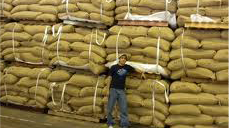The weeks between Valentine’s Day and Easter are usually the sweetest time of year for the chocolate industry. But confectioners are nervous this year because of political unrest in Ivory Coast, the West African country that produces 40 percent of the world’s cocoa beans.
The current ban on cocoa exports from Ivory Coast is raising concerns of a chocolate shortage.
For now, cocoa beans from Ivory Coast are still arriving in U.S. ports.
Jeff Wheeler, president of the Camden International Commodities Terminal in New Jersey, points to one of the ships that transport cocoa beans there.
“This ship here is the Star Tramp,” Wheeler says. “She’s discharging 7,000 tons, which probably represents about 50,000 small-hold farmers in the Ivory Coast.”
Burlap sacks filled with reddish brown cocoa beans are hoisted off the ship and then trucked to nearby warehouses. Wheeler says these beans are already contracted to big chocolate producers.
“I think the processors and manufacturers are in OK shape. But I’m sure we need to get more cocoa out of West Africa to get more comfortable for the rest of the year,” he says.
“ If prices stay at this level, then you should expect that it will get passed on to the consumer, either with some level of price rises or package size reductions.
– Barry Parkin, vice president for chocolate at Mars Inc.
Wheeler says these beans left Ivory Coast before an export ban there went into effect.
Why The Ban?
The internationally recognized winner of last year’s election, opposition leader Alassane Ouattara, called for the ban in order to starve incumbent President Laurent Gbagbo of tax revenues.
That has pushed cocoa prices to a 30-year high. And it has left chocolate producers wondering what will happen when their current cocoa supplies run out.
“It all depends how long it goes on for,” says Barry Parkin, vice president for chocolate at Mars Inc. “If it went on for more than three or four months, there would be a serious impact on the supply that’s needed around the world.”
Growing, Global Demand For Chocolate
No one expects chocolate to suddenly disappear from store shelves. But there are concerns about whether the cocoa supply can keep pace with growing demand as India and China develop a taste for chocolate.
Cocoa trees only grow near the equator. Most of this year’s crop left Ivory Coast before the ban went into effect. But as much as 10 percent of the world cocoa crop this year may be tied up in the country. Parkin says chocolate makers may have no choice but to pass higher prices on to the consumer.
“The whole industry is facing some pretty severe cost pressure this year,” Parkin says. “If prices stay at this level, then you should expect that it will get passed on to the consumer, either with some level of price rises or package size reductions.”
High cocoa prices are already a fact of life for smaller producers.
Smaller Chocolate-Makers
At Mast Brothers Chocolate, an artisan chocolate-maker with one small factory in Brooklyn, N.Y., the beans are roasted on site. Then the precious cocoa nib is separated from the shell in a custom-built machine composed of two enormous glass bottles and some metal plumbing.
“It’s chopping — chopping up all the beans,” says Rick Mast, a co-founder of the company. “And just through the power of suction and wind, it’s separating the lighter shell form the inside, the meats of the bean, which we call the nib.”
The beans in Mast’s chocolate come from sustainable farms in Madagascar, the Dominican Republican and South America. They cost two or three times as much as typical cocoa beans from Ivory Coast. But Mast says they’re worth it.
Africa
Power Struggle Halts Cocoa Exports In Ivory Coast”It is in my mind a bit absurd to expect chocolate to be at every gas station for a buck, where here it is, this exotic product that’s only grown around the equator. It’s not grown in Iowa, you know what I mean? It should be thought of as an affordable luxury, as something that’s decadent,” he says.
In the not-too-distant future, chocolate may be less affordable and more of a luxury, as Mast says — regardless of how the current situation in Ivory Coast plays out.

 News & Events
News & Events